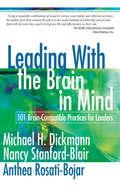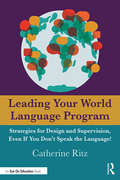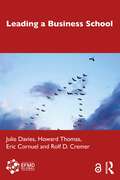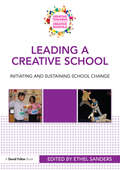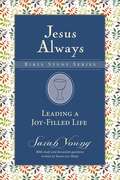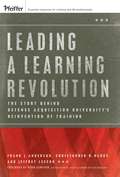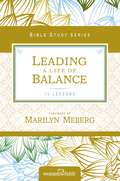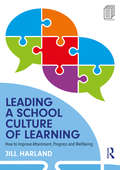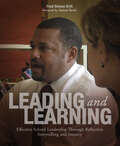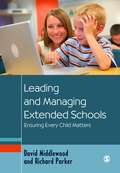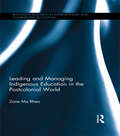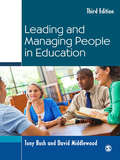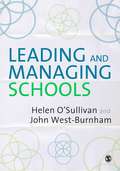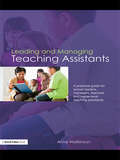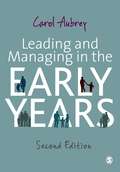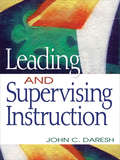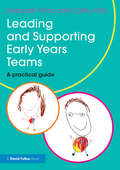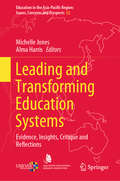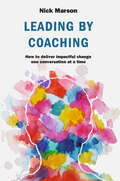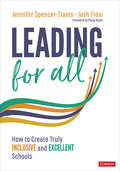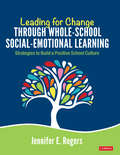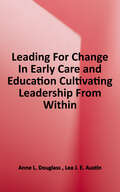- Table View
- List View
Leading With the Brain in Mind: 101 Brain-Compatible Practices for Leaders
by Michael H. Dickmann Professor Nancy Stanford-Blair Dr Anthea L. Rosati-BojarThe authors present a broad repertoire of highly practical "how to" strategies and practices for building capacity and achieving results in a learning organization.
Leading Your World Language Program: Strategies for Design and Supervision, Even If You Don’t Speak the Language!
by Catherine RitzAn essential resource for district, school, and program leaders who supervise, evaluate, or otherwise support World Language programs, this book provides clear, practical guidance on leading an exemplary K–12 World Language program. No matter whether you speak the language, the effective approaches in this book will equip you with the tools you need to implement and evaluate World Language curricula in your school. Catherine Ritz provides a clear and research-based framework for World Language instruction aligned to rigorous national and state standards, and addresses essential concepts and topics, including program and curriculum design, assessment and evaluation, and strategic planning. Whether you are a World Language department chair with years of experience, a school administrator with no background in language education, or a World Language teacher, you will find much to use in this book. It is chock-full of ready-to-use resources and tools, including: Templates for program and unit planning, observation protocols, and sample assessments World LAnguage program models for different age ranges, and a sample curriculum unit Additional resource lists and further reading recommendations.
Leading a Board: Chairs’ Practices Across Europe
by Stanislav Shekshnia Veronika ZagievaThis book represents the first cross-country study of the work of board chairs in Europe. It focuses on what board leaders actually do, rather than what they should do, and elaborates on a conceptual contingency framework for understanding chairs’ work in Europe. In this second edition, 18 experts from 14 European countries interviewed more than 300 chairs, CEOs, directors and shareholders to detect and compare specific practices and instruments that chairs use to deal with various challenges. Researchers also assessed the impact of the COVID-19 pandemic on the work of chairs and the boards they lead. The book benefits incumbent and future chairs, directors, shareholders, CEOs, executives and regulators in developing a systemic understanding of the work of a chair in the European business context and gaining insights into how the leader of the board deals with specific challenges.
Leading a Business School
by Howard Thomas Julie Davies Eric Cornuel Rolf D. CremerBusiness schools are critical players in higher education, educating current and future leaders to make a difference in the world. Yet we know surprisingly little about the leaders of business schools. Leading a Business School demystifies this complex and dynamic role, offering international insights into deans’ dilemmas in different contexts and situations. It highlights the importance of deans creating challenging and supportive learning cultures to enhance business and management education, organizations and society more broadly. Written by renowned experts on the role of the dean, Julie Davies, Howard Thomas, Eric Cornuel and Rolf D. Cremer, the book traces the historical evolution of the business school deanship, the current challenges and future sources of disruption. The leadership characteristics and styles of business school deans are presented based on an examination of different dimensions of their roles. These include issues of strategic positioning, such as financial viability, prestige, size, mission, age, location and programme portfolios, as well as the influences of rankings, sector accreditations, governance structures, networks and national policies on strategy implementation. Drawing on international case studies and deans’ development programmes globally, the authors explore constraints on deans’ autonomy, university and external relations, and how business school deans add value over the period of their tenures. This candid and well-researched book is essential reading for aspiring business school leaders, those hiring and working with deans, and other higher education leaders. The Open Access version of this book, available at http://www.taylorfrancis.com, has been made available under a Creative Commons Attribution-Non Commercial-No Derivatives (CC-BY-NC-ND) 4.0 license. Funded by EFMD Global.
Leading a Creative School: Learning about Lasting School Change (Creative Teaching/creative Schools Ser.)
by Ethel SandersIntroducing creativity to the classroom is a concern for teachers, governments and future employers around the world, and there has been a drive to make experiences at school more exciting, relevant, challenging and dynamic for all young people, ensuring they leave education able to contribute to the global creative economy. Leading a Creative School shows that school leaders are central in any change process, and offers suggestions and models of practice for a whole school change towards creative practice. Providing an accessible overview of key issues and debates surrounding different methods of creative change, practical activities, and stimulus material for to help teachers, this book will explain how to: reflect on why change is important for your school motivate your teaching staff; create the conditions for a whole school change; develop practical strategies to make changes long lasting; and assess and monitor changes taking place. Providing case studies and examples of school change from leading practitioners throughout, this book is an invaluable guide for all those involved in school leadership, management and change.
Leading a Joy-Filled Life (Jesus Always Bible Studies)
by Sarah YoungAfter many years of writing her own words in her prayer journal, missionary Sarah Young decided to be more attentive to the Savior's voice and begin listening for what He was saying. So, with pen in hand, she embarked on a journey that forever changed her—and many others around the world. In Jesus Always, Sarah recounts the words and Scriptures that Jesus has laid on her heart to help her growth in faith and lead a joy-filled existence. She relates how leading a quiet life since writing Jesus Calling has helped her find little treasures that brighten her day—treasures she now shares with readers in the pages of her book.In Leading a Joy-Filled Life, participants will be guided through eight sessions of study that explore what the Bible has to say about expressing gratitude to God in all situations, finding joy even in the mundane aspects of life, and adopting a mindset focused on the eternal blessings that God has promised for those who serve Him. They will discover, as Paul wrote, how to "be joyful in hope, patient in affliction, faithful in prayer" (Romans 12:12).Each eight-session study includes readings from Jesus Always, selected Scripture and study questions, and daily reflection questions, and is designed for use in personal, small group, or classroom settings.
Leading a Learning Revolution
by Anderson Hardy Christopher R. Frank J. Jeffrey LeesonLeading a Learning Revolution tells the compelling story of a learning revolution that took place within the U. S. Department of Defense. Written by practitioners who actually walked the walk, this account of the creation of Defense Acquisition University (DAU) provides a clear blueprint that others can follow. It shares, in detail, the best practices they developed, so that the thousands of training organizations worldwide striving to create premier corporate universities can catapult forward. Offering an insiderÕs look at the process, the authors clearly explain how they transformed an outdated training provider into a world-class university. Step-by-step the book outlines the enduring principles that were pivotal to Defense Acquisition UniversityÕs success and describes the environment, early victories, current methods, and subsequent results. The authors discuss how to establish a mission and vision, develop a performance-based strategic planning process, and tackle change initiative. They also explain the development and implementation of web-enabled learning architecture and reveal how to effectively measure and evaluate performance. In addition, the authors present strategies for assuring continual improvement and organizational growth. With this book, any organization can tap into DAUÕs best practices and winning strategies for improving corporate learning.
Leading a Life of Balance (Women of Faith Study Guide Series)
by Women Of FaithMost of us desire to have balance in our routines. We want to get to the place where our household, work, diet, rest, and exercise schedules are all in perfect harmony. But as believers, we know that if we don’t have spiritual balance, we will never truly have balance in any other area of life. For this reason, we have to consider the state of our heart and determine whether anything is taking priority over God. In this study, readers will have the opportunity to examine our levels of balance and see how they measure up against Jesus’ example. For it is only when we start within—and allow God to work in us—that we can find the equilibrium we need.
Leading a School Culture of Learning: How to Improve Attainment, Progress and Wellbeing
by Jill HarlandThis practical book is designed to help school leaders develop a sustainable culture of learning across the curriculum. It offers a personal insight into how one school embraced a range of dialogic and analytical tools to create an environment in which all stakeholders were inspired to evaluate and innovate. Each chapter tackles one piece of the ‘jigsaw’ that makes up a successful school environment, considering topics such as Attitudes for Learning, Coaching for Learning and Love of Learning. Utilising theory, case studies and activities, it illustrates how the reader can realistically and practically increase student attainment in their own school setting. This book will help leaders: Develop a supportive and encouraging leadership style that will create a cycle of self-improvement and self-efficacy for all Adapt the curriculum to focus on progress and engagement Use the Philosophy 4 Children strategies to promote deeper thinking and enquiry, increasing the rate of school improvement through a system of enquiry based staff professional development Using an inner-city primary school as a working example, this book will be a source of inspiration and encouragement for school leaders, teachers and school advisors looking to cultivate and embed a love of learning into their school.
Leading and Learning: Effective School Leadership Through Reflective Storytelling and Inquiry
by Fred BrillFaced with a vast list of roles and responsibilities and answering to a broad array of stakeholders, school administrators can feel like they must constantly play the role of invincible superhero. Rarely do they have the opportunity to engage in the kind of reflection, inquiry, and collegial sharing that is so effective in teacher professional development. In Leading and Learning , Fred Brill draws on personal narratives from new and experienced school administrators to examine common themes, concerns, successes, and failures. From these stories, practices and protocols emerge to help administrators navigate the complexity of their jobs, and better manage their own professional development. Leading and Learning examines the administrative roles of school leaders from enforcer to system-builder, to instructional leader as well as the psychological, emotional aspects of the position, and the impact of school culture. Fred shares research on the success and structures of professional learning communities and shows how the power of combining PLCs with the practice of reflective storytelling results in better school leadership and professional growth. Woven throughout the book are stories from over 260 interviews with school administrators that will energize readers while generating chuckles and knowing nods. The book' s goal is to provide a model that inspires change in schools and in administrator induction programs. By offering a detailed analysis of effective (and ineffective) leadership, Leading and Learning gives readers a new method for making decisions, solving problems, and working to get things done in their school communities. And by demonstrating the power of reflective storytelling and collaborative learning, it provides school leaders with an effective process for more clearly translating belief into action.
Leading and Managing Extended Schools: Ensuring Every Child Matters (Education Leadership for Social Justice)
by Richard Parker David Middlewood'This is a stimulating and well-researched book that will interest anyone who cares about how our schools should evolve' - Matters Arising 'What are schools for? What happens when school walls come tumbling down, and school and community become inextricably linked, offering a range of extended provision to young people and opportunities for lifelong learning to adults? How would you lead such a school? David Middlewood and Richard Parker draw upon their personal and researched experience, to explore school leadership within a community which has an extended school at its heart. This is an engaging and purposeful book for researchers and practitioners alike' - Professor Ann Briggs, Newcastle University, Chair of BELMAS This book shows leaders of all types of schools how to become effective in extended schooling and fulfil 'Every Child Matters' (ECM) requirements, by building on and adapting their current practices. The authors explain the context of Extended Schools, in the UK and elsewhere, and outline the features of effectiveness in schools and their leaders. The authors provide practical advice using case studies from a range of settings which show what can be achieved across a wide variety of contexts. 'Points to consider' give advice to readers at all levels, covering staffing and resourcing, as well as the creation and development of successful partnerships in the community. This book is an essential resource for leaders beginning in extended schools, and leaders already working in extended schools across nursery, primary and secondary settings. It is also relevant to governors, inspectors and advisers and leaders studying masters and doctorate courses in Leadership and Education Policy.
Leading and Managing Indigenous Education in the Postcolonial World (Routledge Research in International and Comparative Education)
by Zane Ma RheaThis book brings together the academic fields of educational leadership, educational administration, strategic change management, and Indigenous education in order to provide a critical, multi-perspective, systems level analysis of the provision of education services to Indigenous people. It draws on a range of theorists across these fields internationally, mobilising social exchange and intelligent complex adaptive systems theories to address the key problematic of intergenerational, educational failure. Ma Rhea establishes the basis for an Indigenous rights approach to the state provision of education to Indigenous peoples that includes recognition of their distinctive economic, linguistic and cultural rights within complex, globalized, postcolonial education systems. The book problematizes the central concept of a partnership between Indigenous people and non-Indigenous school leaders, staff and government policy makers, even as it holds this key concept at its centre. The infantilising of Indigenous communities and Indigenous people can take priority over the education of their children in the modern state; this book offers an argument for a profound rethinking of the leadership and management of Indigenous education. Leading and Managing Indigenous Education in the Postcolonial World will be of value to researchers and postgraduate students focusing on Indigenous education, as well as teachers, education administrators and bureaucrats, sociologists of education, Indigenous education specialists, and those in international and comparative education.
Leading and Managing People in Education (Education Leadership for Social Justice)
by Tony Bush David Middlewood′This cutting-edge publication is drawn on international research and practice, and undoubtedly encourages reflection and personal development. The authors are experts in the field of education leadership and management.′ - Professor Raj Mestry, University of Johannesburg The Third Edition of this successful and respected book covers leadership and management of people at all levels in educational organisations. It contains up-to-date research and literature, covering the entire spectrum of educational institutions. This new and revised edition: deals with issues such as succession planning, leadership development and diversity has an enhanced focus on international trends, examples and research acknowledges the changing English context, including the shift to system leadership, academies and free schools covers changes in Scotland, Wales and Northern Ireland The book will be of great interest to postgraduate students, researchers and academics; candidates on professional leadership qualifications; middle and senior managers, and aspiring leaders in schools and colleges. Tony Bush is Professor of Educational Leadership at the University of Warwick, UK and Visiting Professor at the University of the Witwatersrand, South Africa. David Middlewood is a Research Fellow at The University of Warwick.
Leading and Managing Schools
by Helen O'SullivanSchool leadership and management are fundamental components of school improvement. This is the first study of its kind to relate the principles of effective leadership to the broad spectrum of school life in Ireland. A key resource for school leaders in their personal and professional study, Leadership and Management in Schools critically appraises issues in leading and managing schools. The editors bring together an array of renowned scholars to inform and stimulate the debate on the future of leadership development in Irish schools. Each author explores different perspectives and sets a framework for rethinking school leadership and management and an agenda for future research. The book includes in-depth discussions of a broad spectrum of issues encountered by practitioners, such as justice and equality as cornerstones of any educational system, principles of good governance, and the key positions of accountability and leadership of change. Inspiring and informative in its style, the authors bring together a range of perspectives on every aspect of school leadership and management, from well known contributors such as Michael Fullan, Ciaran Sugrue and Marty Linsky, creating a unique and rich canvas. Focusing on national and international perspectives this book adds to the growing canon of international studies of school leadership.
Leading and Managing Teaching Assistants: A Practical Guide for School Leaders, Managers, Teachers and Higher-Level Teaching Assistants
by Anne WatkinsonThere are more than 200,000 teaching assistants(TAs) in the UK. This comprehensive, practical book deals with how to make use of them effectively. Written by a recognised authority on TAs the book investigates the roles of leadership and management the various roles of TAs and what distinguishes them from other support staff the whole-school learning environment Auditing the needs of the school and the needs of the TAs good practice in appointing and developing TAs – technicalities, examples and proforma. using a TA in the classroom - guidance for teachers leading a team of TAs. This supportive and stimulating book is complemented with practical and effective strategies for managing TAs. TAs can contribute to higher standards for pupils, better curriculum delivery, improved work-life balance and effectiveness for teachers and support for whole school policies. Including examples of good practice, real-life accounts, research evidence, sources of help and suggestions for further reading, this book provides all the guidance a manager will need to help them make the best use of their TAs.
Leading and Managing in the Early Years
by Carol AubreyThis second edition of Leading and Managing in the Early Years explores and integrates leadership and management practice with a real understanding of early years settings. Revised and updated, this new edition includes further coverage of reflective practice and reflective leadership skills, EYPS as well as integrated center leadership, more on CPD (Continuing Professional Development), the impact of CLLD (Communication, Language and Literacy Development) initiatives and implementation of APP (Assessing Pupils' Progress), and practical suggestions for working with resistant groups and individuals.<P><P> Carol Aubrey investigates different concepts and characteristics of EC leadership as well as the roles and responsibilities of EC leaders. She also explores the types of leadership programs or development which is needed to maximize the effectiveness of EC leaders. This book is essential reading for students in Early Childhood courses, Early Years Practitioners and local authority employees involved with the integrated centers initiative.
Leading and Supervising Instruction
by John C. DareshThis practical and timely text coaches school principals on how to achieve effective supervision that centralizes student learning and encourages teachers' uniquely effective instructional styles.
Leading and Supporting Early Years Teams: A practical guide
by Deborah Price Cathy OtaHow a staff team works together and how effective and cohesive they are impacts significantly on the children that they care for as well as having implications for the general early years practice and the success of the business of the setting. Drawing together theory and practice this book provides comprehensive guidance on recruiting, supervising and leading an early years team in line with the most recent national guidance. Focusing on all aspects of leading and supporting a team, the book aims to inspire managers and increase their confidence. It looks at the day-to-day demands of running a setting and the reflective thinking that is needed to establish a vision for a team. The authors consider the skills needed to lead and support a team and offers practical guidance on: recruitment, induction, ongoing staff training and supervision disciplinary processes including handling difficult conversations, refocusing a team after a critical incident staff relationships with parents and other professionals involving the team in problem solving and implementing change engaging with the community how to get support for yourself as a manager This book will be invaluable support for both new and experienced managers wanting to establish a cohesive and dynamic staff team and provide outstanding childcare provision.
Leading and Transforming Education Systems: Evidence, Insights, Critique and Reflections (Education in the Asia-Pacific Region: Issues, Concerns and Prospects #52)
by Alma Harris Michelle JonesThis book explores the ongoing transformation processes in various education systems, including those in Asia. Drawing on research, policy and practice in a diverse range of contexts to illuminate the process of system transformation and improvement, it provides a rich comparative basis for considering large-scale reform and offers contemporary reflections and insights into the process of school and system improvement. The book features informed critique, as well as descriptions, analyses and assessments of system reform in all its facets. Accordingly, it offers unique perspectives on the change processes, and reveals how numerous countries in Asia and elsewhere are tackling the challenge of transforming their schools and education systems.
Leading by Coaching: How to deliver impactful change one conversation at a time
by Nick MarsonLeadership used to be about telling people to go where you sent them– now it’s about persuading them to come with you.Old leaders needed to create an artificial persona of infallible authority to issue orders that were obeyed – today’s leaders need to uncover their own authentic leadership personality and bring that open and honest self to conversations that bring others to willing and lasting change.To do so effectively they need to unlearn old leadership behaviours and develop totally different ones. In Leading by Coaching Nick Marson shows how. Leaders are shown how to “Look In” to develop greater self-awareness, “Look Out” to others by utilising a coaching approach, and “Look Beyond” to face uncertainty, manage adaptability and acquire resilience.Marson’s approach is based on deeply researched principals, multiple social science disciplines, the latest cognitive, neurological and psychological research, and in-depth research interviews with over 20 CEOs and senior executives. It has been developed and refined over many years of practice. If leaders want to drive impactful change, they need to understand how to hold the coaching conversations that power it. They need to lead by coaching.
Leading for All: How to Create Truly Inclusive and Excellent Schools
by Jennifer Spencer-Iiams Josh FlosiDevelop inclusive and equitable school communities where all learners thrive Research has shown that inclusive education results in better academic outcomes for ALL students, not just those identified with disabilities, by promoting self-efficacy, improving social and emotional health, and consistently implementing research-based instructional strategies. Still, many schools rely on deeply ingrained, segregated practices that fail to serve all students. Leading for All is a practical guide that provides a clear pathway for educators to develop a more inclusive school community from start to finish. Authors Jennifer Spencer-Iiams and Josh Flosi share lessons learned from spending nearly a decade building district schools where all students are served in their neighborhood school and in classrooms with their general education peers. Features include: Three focus areas to guide change: Creating Inclusive Cultures, Improving Instructional Practices, and Increasing Student Voice 7 Components of Inclusive and Equitable Learning Communities Supporting resources for promoting inclusion throughout the school day, including co-curricular activities and transportation Stories of real students and teachers and the actions that impacted their success Educators and school leaders want to create inclusive and excellent educational experiences for all students, but they do not always know how to proceed. Leading for All provides a model, stories, strategies, and clear evidence that it can be done effectively.
Leading for All: How to Create Truly Inclusive and Excellent Schools
by Jennifer Spencer-Iiams Josh FlosiDevelop inclusive and equitable school communities where all learners thrive Research has shown that inclusive education results in better academic outcomes for ALL students, not just those identified with disabilities, by promoting self-efficacy, improving social and emotional health, and consistently implementing research-based instructional strategies. Still, many schools rely on deeply ingrained, segregated practices that fail to serve all students. Leading for All is a practical guide that provides a clear pathway for educators to develop a more inclusive school community from start to finish. Authors Jennifer Spencer-Iiams and Josh Flosi share lessons learned from spending nearly a decade building district schools where all students are served in their neighborhood school and in classrooms with their general education peers. Features include: Three focus areas to guide change: Creating Inclusive Cultures, Improving Instructional Practices, and Increasing Student Voice 7 Components of Inclusive and Equitable Learning Communities Supporting resources for promoting inclusion throughout the school day, including co-curricular activities and transportation Stories of real students and teachers and the actions that impacted their success Educators and school leaders want to create inclusive and excellent educational experiences for all students, but they do not always know how to proceed. Leading for All provides a model, stories, strategies, and clear evidence that it can be done effectively.
Leading for Change Through Whole-School Social-Emotional Learning: Strategies to Build a Positive School Culture
by Jennifer E RogersDevelop and cultivate a positive school culture! Calling all change agents! If you are hoping to join other schools and districts across the country that are adopting Social-Emotional Learning (SEL) programs and practices to improve student outcomes and teacher capacity, then you’ve found the right book. Let Jennifer Rogers share her specialized experience in developing and implementing behavioral and social-emotional programs and support with you. The practical framework outlined in this book comprises real-world experiences and evidence-based strategies to integrate systemic change toward a positive school culture. With sustainable practices in mind, this guide features thought-provoking worksheets to explore staff understanding of SEL, collect evidence, influence instruction, and more a step-by-step rubric to guide implementation with recommendations resources to explore at the end of each chapter reflection questions to promote deeper thinking SEL is about both prevention and intervention. For the stakeholders engaged in this work who must think reflectively about schools, this book offers the support, strategies, processes, and tools, to teach students these competencies in a comprehensive and sustainable way.
Leading for Change Through Whole-School Social-Emotional Learning: Strategies to Build a Positive School Culture
by Jennifer E RogersDevelop and cultivate a positive school culture! Calling all change agents! If you are hoping to join other schools and districts across the country that are adopting Social-Emotional Learning (SEL) programs and practices to improve student outcomes and teacher capacity, then you’ve found the right book. Let Jennifer Rogers share her specialized experience in developing and implementing behavioral and social-emotional programs and support with you. The practical framework outlined in this book comprises real-world experiences and evidence-based strategies to integrate systemic change toward a positive school culture. With sustainable practices in mind, this guide features thought-provoking worksheets to explore staff understanding of SEL, collect evidence, influence instruction, and more a step-by-step rubric to guide implementation with recommendations resources to explore at the end of each chapter reflection questions to promote deeper thinking SEL is about both prevention and intervention. For the stakeholders engaged in this work who must think reflectively about schools, this book offers the support, strategies, processes, and tools, to teach students these competencies in a comprehensive and sustainable way.
Leading for Change in Early Care and Education: Cultivating Leadership from Within (Early Childhood Education Ser.)
by Anne L. DouglassFeaturing both research findings and practical recommendations, this book presents an innovative framework for nurturing leadership in the care and education of young children. Early educators are often seen as the objects of change, rather than the architects and co-creators of change. Douglass calls for a paradigm shift in thinking that challenges many long-held stereotypes about the early care and education workforce's capacity to lead change. Case studies show how educators use their expertise every day to make a difference in the lives of children and families. These accounts demonstrate concrete strategies for expanding current thinking about who can be leaders for change and for developing more inclusive pathways for leadership. This book has the potential to revolutionize the field with a new model for developing and nurturing innovative, entrepreneurial, and skilled early educator leaders capable of driving transformative change-from classrooms and home-based programs to communities and beyond. Includes a cross-disciplinary examination of leadership, improvement, and innovation, a framework for building ecosystems that supports professional growth and teacher retention, case studies that reveal immense untapped potential from within the early care and education workforce, and a critical look at the current state of leadership and quality improvement in early childhood education.
